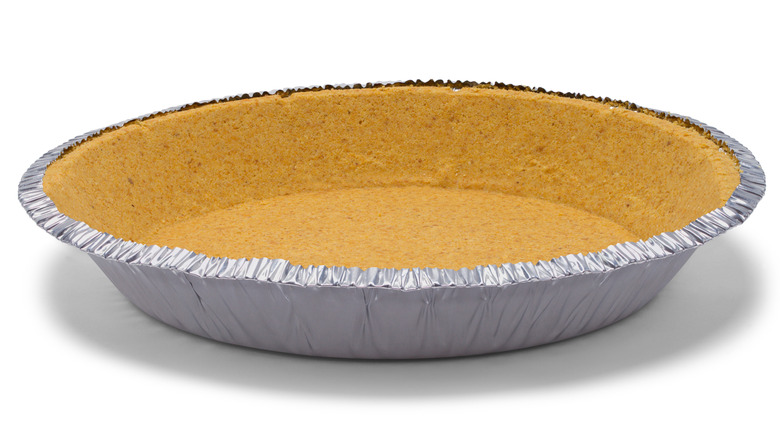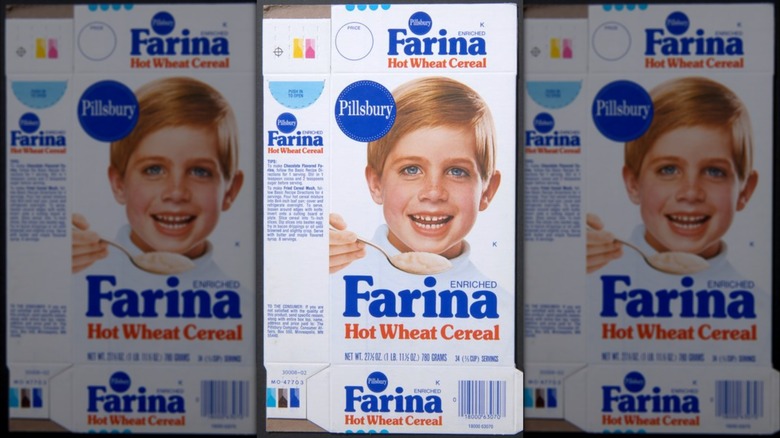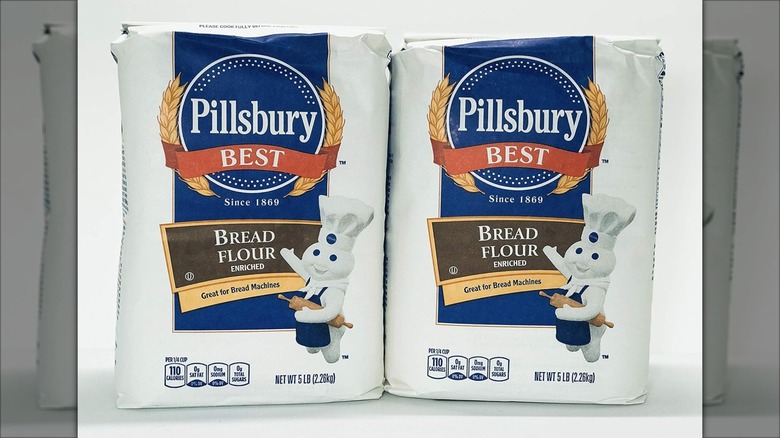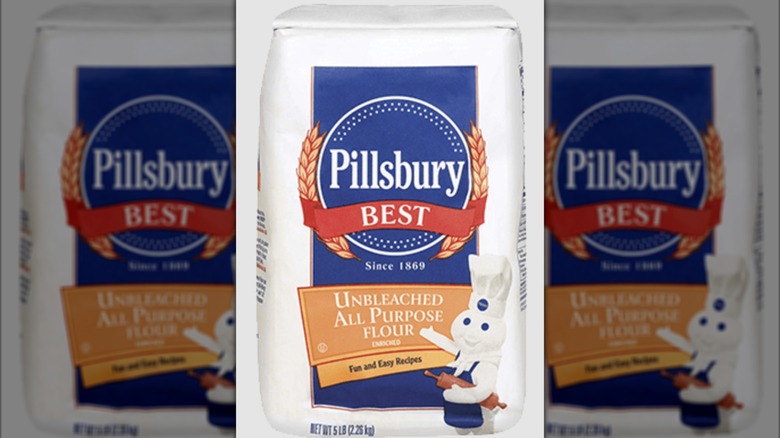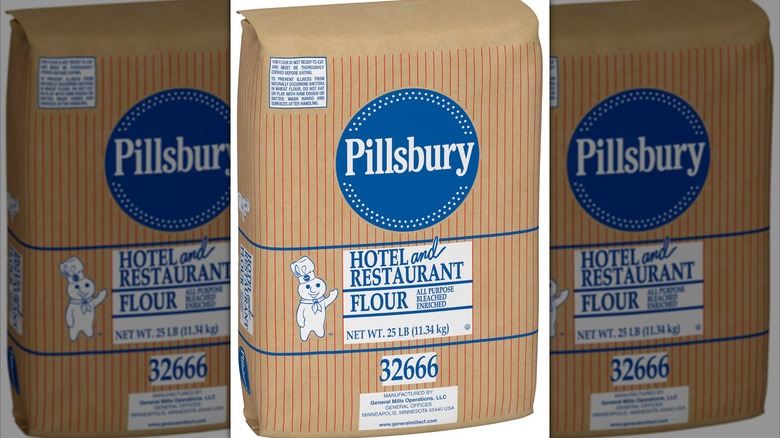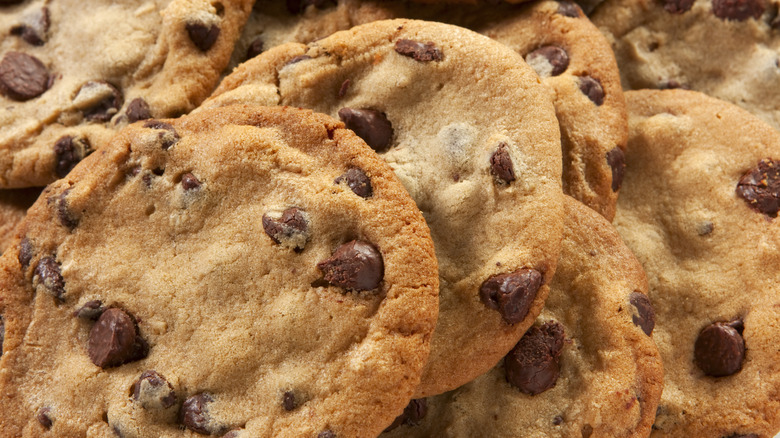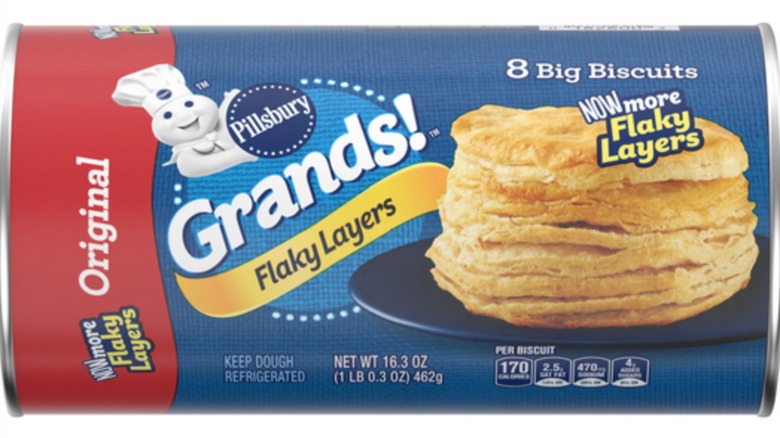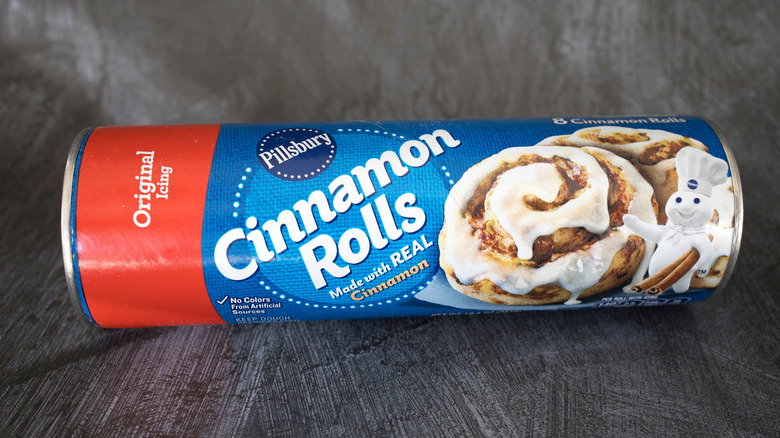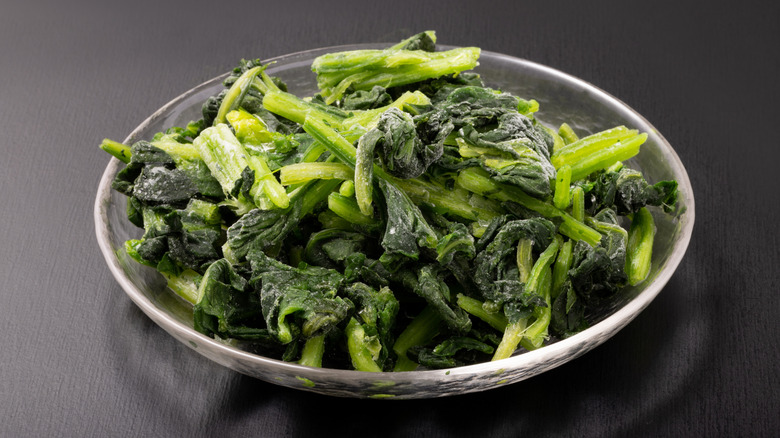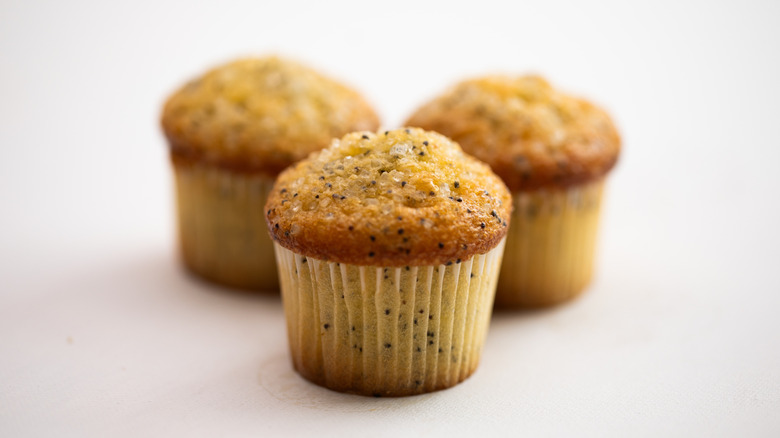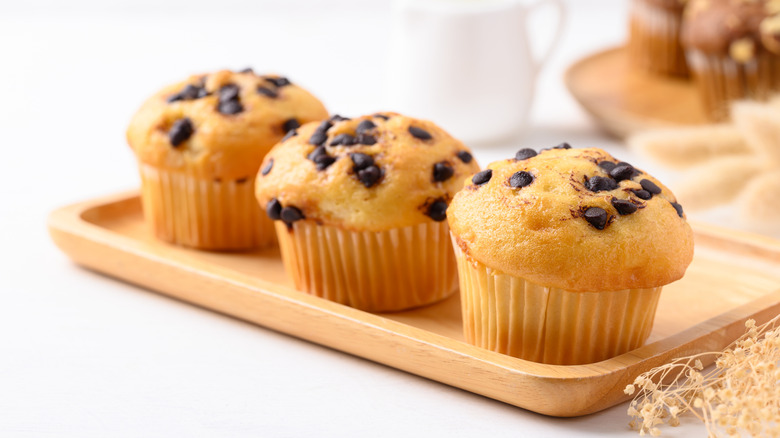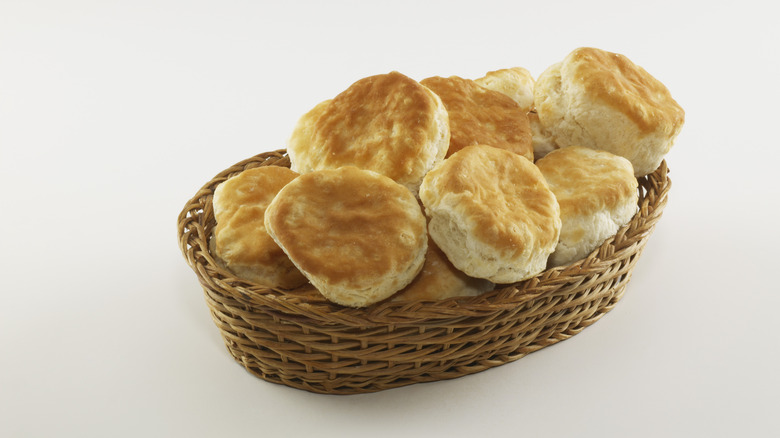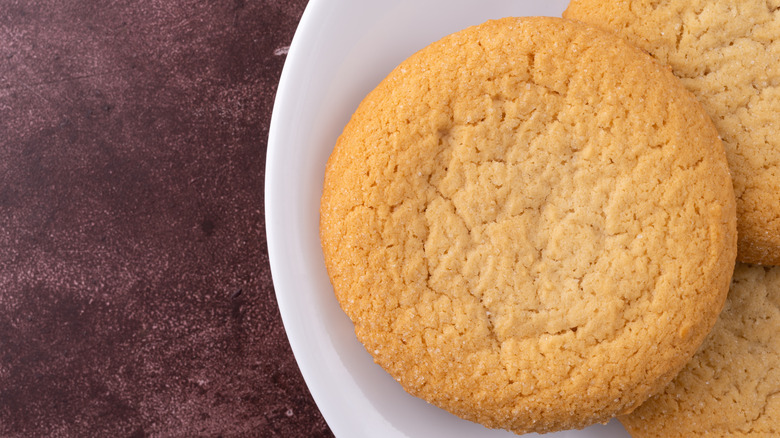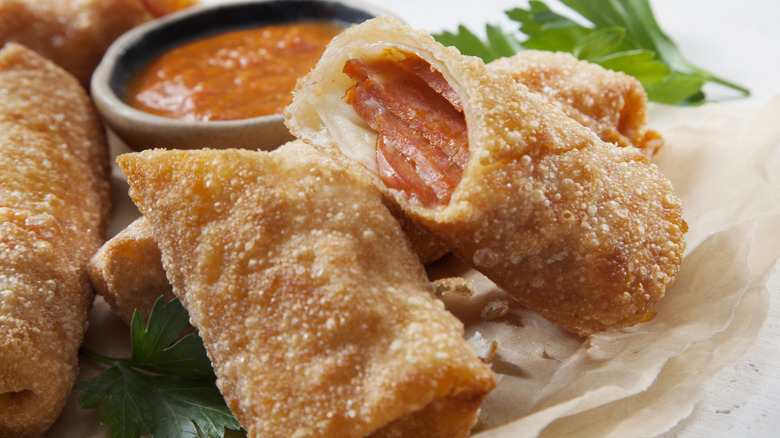14 Recalls That Will Always Haunt Pillsbury
We may receive a commission on purchases made from links.
If you ever need an example of a food brand that's nailed its image, look no further than Pillsbury. The baking brand and its beloved Pillsbury Doughboy are basically synonymous with comforting bake-at-home products that are as cozy as they are affordable. So it makes it all the more surprising when Pillsbury steps out of line, and issues a product that's in some way damaged or compromised. Unfortunately, it's done so more than a few times in its history, leading to some fairly disastrous recalls — and on those occasions, not even the cute-as-a-button Doughboy could stop folks from thinking twice about buying its food.
While some food companies tend to have to recall their products for repeated occurrences of the same reason, which can point to some long standing issue in their supply chains, Pillsbury's recall reasons are a bit more diverse. It's been plagued by bacterial scares, with E. coli and Salmonella fears prompting recalls, but it's also faced contamination from other sources — like fly larvae. It's even had to deal with glass and plastic making its way into its products (including, rather terrifyingly, its cereals), and it has had its fair share of mislabeling events too. Even recalls that occurred decades ago still haunt Pillsbury to this day.
1. A strangely flavored pie crust had to be recalled in 2021
The best pie crusts should be able to reinforce the taste of our filling without overwhelming it. What we don't want, though, is for pie crusts to taste bad — especially if they're made by a food manufacturer. This was the case in 2021, when Pillsbury seemingly made several batches of its Refrigerated Pie Crust that had some unforeseen hiccups in the production process. These hiccups led to the chance of these crusts having an off flavor, prompting them to be recalled.
The pie crusts were distributed to stores run by the Defense Commissary Agency, with its outlets all around the country receiving the product and having to withdraw them from shelves. It's important to point out that neither the Defense Commissary Agency or Pillsbury itself stated that the strange flavor in the pie crusts didn't mean that they were unsafe to eat, and instead meant that they just weren't up to scratch on the quality front. However, they were both also notably cagey about what actually happened with their production, and why they had their weird flavor in the first place. Even without the production issues though, Pillsbury's pie crusts don't tend to rank too high against other store-bought versions.
2. In the 1970s, Pillsbury cereal was recalled because of potential glass contamination
Glass in breakfast cereal is the stuff of horror films, and every parent's worst nightmare. Way back in 1971, though, this nightmare became a reality. Pillsbury had to issue an urgent recall of its Farina cereal after it was discovered that glass particles might have made their way into certain packages. The news was first delivered via telegram (it was the '70s, after all) to The Greenfield Recorder, a daily newspaper distributed around Franklin, Massachusetts, instructing retailers in the Western part of the state to withdraw the cereal boxes from their shelves immediately.
While food companies can often be a little coy nowadays about how foreign contaminants like glass and plastic end up in their food, back in the 1970s it appears that they were a bit more open about things. It was revealed that the potential glass contamination was down to a shield breaking in its manufacturing plant. The breakage apparently caused glass to be dispersed in the manufacturing area, and these glass pieces then may have fallen into the cereal. We're all for a little crunch in our cereals, but this really takes things a step too far.
3. Pillsbury bread flour was involved in a recall during a multi-state E. coli outbreak
When E. coli poisoning occurs as a result of mass-produced products, the scale of the issue can often spread far and wide. In 2019, there was yet another example of this, with E. coli being linked to one of the most innocent food products out there: flour. Multiple brands, including Pillsbury, were embroiled in a recall involving their flours, with Pillsbury's Best Bread Flour having to be recalled because of potential E. coli contamination. Aldi, King Arthur Flour, and Brand Castle Mixes were also implicated in the recall, with the outbreak starting in December 2018 and infecting a total of 21 people across nine different states.
While three people were hospitalized as a result of the E. coli outbreak, there were luckily no fatalities associated with it. The complicated thing about this specific recall was that unlike other foods that can be contaminated with E. coli or other bacteria that have a short shelf life, flour can sit in people's pantries for months or years, making the timescale of potential illnesses way longer. It was likely made even more complicated by people forgetting that flour is often a raw product that is very capable of harboring harmful bacteria, and failing to cook it properly (like using it in cookie dough recipes) can result in serious illness.
4. Salmonella contamination prompted a 2019 flour recall
It's entirely possible for flour to contain Salmonella, and for that flour to cause dangerous outbreaks of illness. In 2019, it was Pillsbury's turn to reckon with this fact. Well over 12,000 cases of its Unbleached All-Purpose Flour had to be recalled after traces of Salmonella were found in the product. The flour was sold through various retailers, and while nobody had become sick at the time the recall was announced, it was still clearly a serious situation.
However, this recall was far from straightforward, and opened up a few questions about who is responsible for a recall at any given point. It appears that the first notices were posted by the retailers who sold the flour, and it took Hometown Food Co. Inc., the company that owns the Pillsbury brand, several days to put the recall on its own website. When responding to questions from Food Safety News, a Pillsbury spokesperson noted that it had let retailers know about the need for the recall "within 24 hours of determining a recall was warranted," and that its lack of immediately posting its own recall was intentional. It's arguable, though, that doing so would have reached a larger amount of customers more quickly.
5. Pillsbury's hotel & restaurant flour had to be recalled due to an E. coli scare
The last thing you want when you come away from a restaurant or hotel is to come down with food poisoning. Alas, that may have been slightly more likely than you think back in 2016. Several batches of Pillsbury Hotel & Restaurant All-Purpose Bleached Enriched Flour had to be recalled because of the potential presence of E. coli in the product. The recall wasn't just for Pillsbury flour either, but also involved a host of flour products under the Gold Medal brand name, and a batch of Uncle Julio's Tortilla Flour.
It's arguable that contaminated flour destined for use in hotels and restaurants may be less likely to infect people than batches used in home kitchens, given that food professionals are probably going to be more careful about cooking flour until it's completely safe. However, there's also a higher risk of cross-contamination in busy kitchens, which could lead to an increased risk of food poisoning. The good news, though, was that this recall didn't seem to be as a result of any illnesses.
6. Undeclared walnuts prompted a recall of cookie dough
Nuts are common in baked goods, and this presents a real issue for folks who have nut allergies — especially when food companies fail to label their products properly to indicate the presence of nuts, or give them the wrong label entirely. This occurred in 1998, when a labeling mix-up almost led to disaster for Pillsbury. The company had to issue a hasty recall of its refrigerated Pillsbury Chocolate Chip Cookies cookie dough, after it was discovered that it had actually put its Chocolate Chip Cookies with Walnuts dough inside the packages instead. As such, the mislabeled product posed a massive risk for people with tree nut allergies, and could have prompted a dangerous allergic response.
The good news was that at the time of recall, that worst-case scenario hadn't happened: No one had stated that they had become ill from eating them. However, it was a real close call. Even the smallest trace of tree nuts can trigger life-threatening symptoms, and walnuts themselves don't have a hugely distinctive smell, with just a light nuttiness and fatty scent that could be easily masked by the smell of chocolate. It's not unreasonable to assume folks could have eaten them without realizing they were in there.
7. A packaging error led to a biscuit recall
Is it so unreasonable to ask that food products are correctly labelled? We don't think so, and we're sure that food manufacturers agree — so it's amazing how often they get this simplest of tasks wrong. In 2014, it was Pillsbury's turn to once again have to put out a fairly embarrassing recall because of a mislabeled item. It turned out that individual packages of its Pillsbury Buttermilk Biscuits were put into larger overwraps displaying Pillsbury's Flaky Biscuit product. Although the packages inside the overwrap did state the correct product on them, it's not hard to see how people would have missed this and just jumped straight in.
However, this recall wasn't just tricky for Pillsbury because it had put out an incorrectly labelled product. It was also tricky because that product contained milk (which of course came from the buttermilk), which wasn't flagged on the exterior. Therefore, anybody with a milk allergy or lactose intolerance may have been in for a nasty, potentially harmful surprise when eating them. In total, Pillsbury had to recall 720 cases of its biscuits, adding up to thousands of individual products.
8. When plastic potentially made its way into Pillsbury's famous cinnamon rolls, they were recalled
Pillsbury's cinnamon rolls are a pure hit of nostalgia, and making them is the perfect way to kick off a long, slow weekend without having to toil for hours in the kitchen. They're only really enjoyable, though, when they don't have plastic inside them. This might not sound like that likely of a scenario, but in 2013, it could have been a reality in your home, thanks to a contaminated batch of Pillsbury Cinnamon Rolls with Icing making its way to market. The refrigerated rolls were apparently compromised when a piece of plastic made its way onto the production line, and then potentially into the rolls themselves.
The amount of cinnamon rolls that Pillsbury had to recall was fairly limited (although they were sold nationally, making the spread of the product wider), but that doesn't make this event any less serious. Even small pieces of plastic can pose a choking hazard, especially in kid-friendly foods like cinnamon rolls, and may also cause cuts or perforations to the digestive system. Honestly, we'd just prefer to make our own cinnamon rolls instead of risking that.
9. Fly larvae contamination resulted in a recall of frozen spinach
Of all the undesirable things that we don't want to end up in frozen spinach, we'd put fly larvae pretty high up on the list. The good news is that you usually don't have to worry about that, as much frozen spinach is larvae-free. Unless you were buying Green Giant spinach supplied by Pillsbury in 1995, that is. In June of that year, the food company put out a recall of four of its frozen spinach products, after it was found that two of them were contaminated. Apparently, a customer had found fly larvae in their product, and further testing revealed that it had got into other items too. Gross.
Pillsbury confirmed that the larvae-infested spinach had all come from one specific plant, but beyond that it was unwilling to reveal many more details. As such, it's not entirely clear how the larvae ended up there. It could have been via cross-contamination, or the larvae taking root in the spinach's environment (or, indeed, the spinach itself — certain flies burrow their way into spinach, contaminating the leaves). Whatever the reason, it's not something you want to find in a healthy side dish.
10. A 2011 South African recall occurred due to a nut scare
Pillsbury's recall woes haven't just been isolated to its products in the United States: It's also faced trials overseas. In 2011, the brand was involved in a recall put out by General Mills South Africa after it was discovered that its products could contain nuts. Pillsbury Lemon Poppyseed Muffin Mix was apparently contaminated with nuts, which weren't included on the ingredients label (which isn't that surprising, given that you wouldn't expect them to have nuts in the first place). As such, several batches of the item had to be tracked down before they could cause harm.
It's worth pointing out that while poppy seeds and nuts are different things, and folks who have tree nut allergies may safely enjoy seeds, there is some cross-reactivity in the other direction. A study published in The Journal of Allergy and Clinical Immunology: In Practice found a correlation between poppy seed allergies and allergic responses to tree nuts. However, this cross-reactivity still doesn't explain how nuts had potentially made it into the muffins in the first place.
11. When milk wasn't listed on the product label, Pillsbury's chocolate chip muffin mix had to be recalled
Milk is one of the most common ingredients in baked goods and can show up in loads of different places and as a sub-ingredient in multiple additions. In 2002, this tendency prompted a recall from International Multifoods Corp., the company that owned the Pillsbury brand at the time. International Multifoods had to recall just over 750 cases of its Pillsbury Chocolate Chip Muffin Mix after it was found that the chocolate chips in the mix had milk in them. This milk wasn't declared anywhere on the product label, therefore posing a serious allergic risk to anybody who ate them.
While it might be obvious that chocolate chips have milk in them to some, this doesn't change the fact that milk should be listed on the ingredients label. Plus, it's worth remembering that it's entirely possible for chocolate chips to be milk-free. This of course isn't the case with milk chocolate chips, but semi-sweet chocolate chips may not have any milk at all, and can instead be a combination of dark chocolate and sugar. It could be the case that its supplier inadvertently switched its chips without realizing, or this recall could be down to a printing error.
12. Plastic contamination prompted a 2001 recall of frozen biscuits
Most of us get through enough plastic each day without having to worry about it getting into our food. As such, it's always a nasty surprise when a food brand puts out an item that has plastic contamination. This happened in 2001, when Pillsbury were responsible for unleashing thousands of cases of its frozen biscuits on the unsuspecting public, and they were contaminated with plastic strands. Eating the Southern-style biscuits could have put consumers at risk of choking, and as such, a recall had to be issued.
It was a big recall too, people. While Pillsbury has often gotten away with limited recalls of just a few batches of its items, this time it had to recall approximately 30,000 cases of the frozen biscuits. These cases were distributed across the country, and combined with the sheer quantity of the items, it was clearly a pretty big job for Pillsbury to get them all back. Where the plastic strands came from wasn't totally clear, but as with so many sources of plastic contamination, it could have been down to faulty or old production equipment being used or good old human error.
13. When its sugar cookie dough may have contained peanut butter, it sparked a recall
The taste of standard sugar cookies and peanut butter cookies are pretty different, and they usually have one distinct difference: One has peanut butter in it, and one doesn't. We hate to state the obvious with that one, but it's worth flagging these facts to point out how wild it was that nobody at Pillsbury noticed back in 1997 when its sugar cookie dough got peanut butter in its batch. When these cookies went out to market without peanut butter listed on the label, it prompted a recall of the products, which were sold in Houston and San Antonio, Texas, and Grand Junction, Colorado, regions.
Of course, it may well have been the case that these were peanut butter cookies made with a sugar-based dough — but if that was the situation, they still should have had peanut butter on the label. Given that peanut allergies could affect up to 2% of the population, there was clearly a pressing need to get this recall over with as quickly as possible.
14. A packaging mix-up led to a wide recall of pizza rolls
In 1994, Pillsbury fell foul of yet another packaging mishap, which led to the issue of a nationwide recall. At the time, the company owned the Jeno's and Totino's pizza roll brand, and was shipping its Pepperoni & Cheese flavor pizza rolls to supermarkets across the country. At some point, though, things got a little mixed up at the packing plant where the pizza rolls were boxed, and egg rolls started being funneled into the Jeno's and Totino's packages instead.
These egg rolls started being shipped around the country, leaving unsuspecting customers with the wrong product. Naturally, this was probably pretty devastating to anyone hoping for their pizza roll fix. However, it was also a very serious issue for folks who had shellfish allergies, as eating the rolls could cause an allergic response. Some pizza rolls don't look that different from egg rolls, after all, and so it would be easy to take a bite without realizing they were the wrong product.

